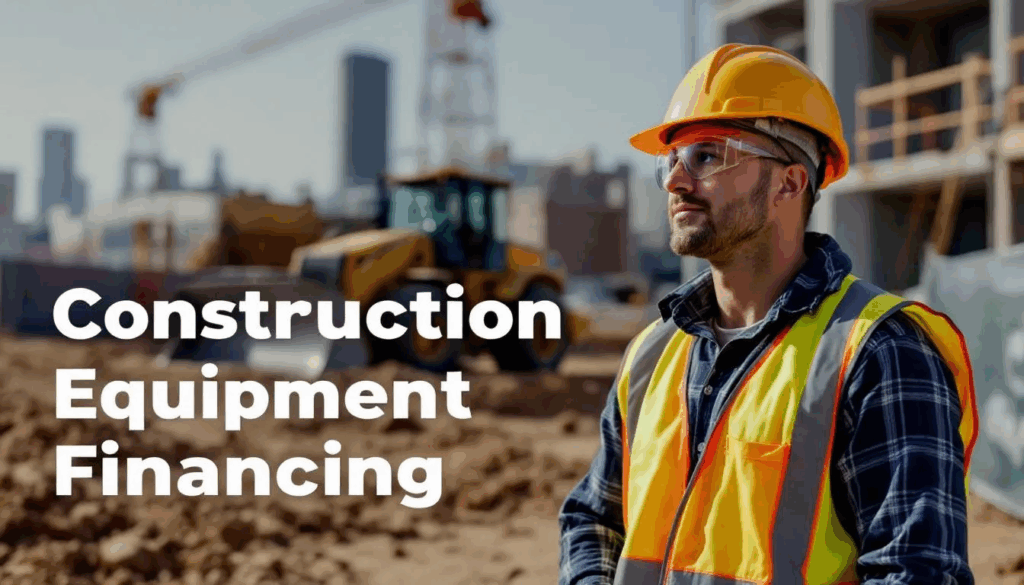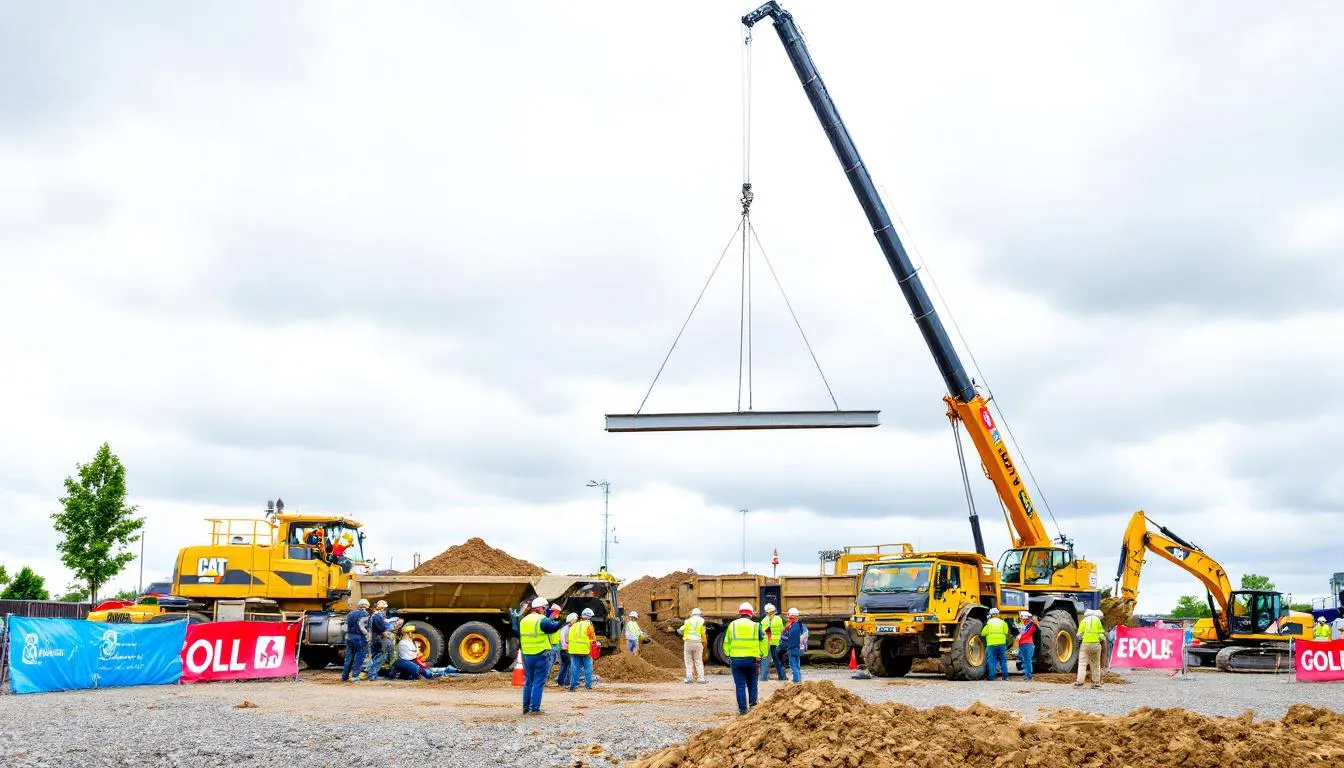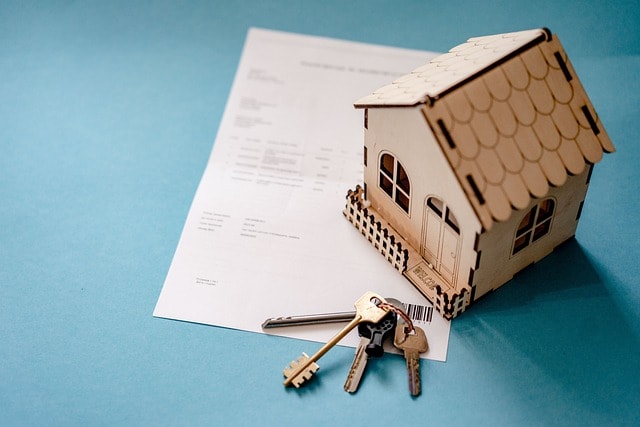What is Equipment Financing for Construction/Contractors?
Construction equipment financing is a type of business financing designed to help contractors and construction companies acquire the industrial equipment, heavy machinery, and tools they need without paying the full cost upfront. Heavy equipment financing refers to financial solutions that allow businesses to acquire large machinery over time instead of paying upfront.
Equipment loans provide ownership of heavy machinery and typically require the equipment to serve as collateral. Many construction equipment financing solutions are tailored for small to medium-sized businesses, and many financing options allow businesses to retain liquidity while acquiring necessary equipment. Businesses can finance both new and used construction equipment through various lenders, from road machines to industrial tools, depending on the project’s needs.
How does Construction Equipment Financing work?
Equipment financing through United Capital Source’s lender network features:
- Loan Amounts: Up to $10 million per piece of equipment
- Interest Rates: Starting at 6.5% (SBA) – 7% – 15% Private Lender Average
- Funding Terms: 1 – 10 years
- Funding Speed: 1 – 2 Business days
Construction equipment financing allows you to purchase or lease equipment through a lender, spreading the costs over a fixed term with manageable monthly payments. Construction equipment financing options vary based on the lender and the customer’s business type. Some equipment manufacturers also provide financing.
Some lenders provide financing for both new equipment purchases and used equipment acquisitions, often with competitive rates and fixed payments. Financing options can include tools for managing monthly budgets and expenses. Soft costs like installation and delivery can sometimes be financed along with equipment purchases.
Many arrangements include predictable monthly payments for budgeting purposes. Fixed payments in financing agreements promote better financial planning and budgeting for businesses. Flexible payment schedules, such as quarterly or seasonal payments, may be available depending on the lender. Flexibility in payment options can significantly impact cash flow management for businesses.
Additionally, some lenders provide options to pay off equipment financing early without penalties. Many lenders can provide decisions on equipment financing applications within 24–48 hours. Some lenders offer same-day approvals for equipment loans under a certain amount, typically $250,000.
What are the qualifications for Construction/Contractor Equipment Financing?
Qualifying for construction equipment financing often depends on your company’s financial health, equipment type, and credit history. Construction equipment financing usually includes an evaluation of the borrower’s monthly budget.
Lenders will typically assess your credit score, annual revenue, time in business, and business operations history. The equipment financing application process normally involves several steps and documentation. Necessary documentation may include financial statements, tax returns, and proof of cash flow. The better your balance sheet and overall business performance, the more favorable loan terms and interest rates you may receive.
Approved businesses we work with here at UCS typically meet the following minimums:
- Credit Score: 475+
- Annual Revenue: $250k+
- Time in Business: 6+ months
How do I apply for Construction Equipment Financing?
Follow these steps to apply with United Capital Source.
Step 1: Ensure that buying equipment is the right choice for your business.
You want to make sure the construction equipment is worth the cost of the loan. The lender will review the equipment to determine if its lifetime value justifies the invoice cost. You want to ensure the new equipment can effectively complete the job.
Step 2: Gather your documentation.
You need to provide the following:
- Driver’s license
- The invoice for the construction equipment
- Voided check from your business checking account
- Bank statements from the past three months to demonstrate cash flow
- Financial statements
Step 3: Complete the application.
The application process is relatively fast, and you can apply directly through our one-page application in a matter of minutes or reach out to one of our loan experts to guide you through the process.
Step 4: Speak to a representative.
After we receive your application, a senior account executive will reach out to you. The account executive will discuss your needs and focus on providing you with equipment loan offers. We offer complete transparency, with no hidden fees or surprises.
You’ll get a complete breakdown of loan amounts, terms, and fees. Once you have all the information, you can decide which options make the most sense for your business.
Step 5: Get approved.
Your loan is approved once your application meets underwriting requirements and receives credit approval. Next, the money is paid directly to the seller to settle the invoice. We can help you set up automatic payments, or you can arrange to pay by check or electronic payment.
What are the benefits of Construction Equipment Financing?
Financing equipment allows immediate use of the equipment, while the revenue it generates can help offset payments. Businesses can retain liquidity because they do not tie up their cash in asset purchases when financing equipment.
This type of financing helps businesses manage their cash flow more effectively by spreading the cost of expensive machinery over time. Financing can unlock significant tax savings through Section 179, allowing a first-year write-off of eligible equipment costs.
Many financing agreements come with fixed interest rates, meaning monthly payments remain consistent throughout the loan or lease term. Choosing financing options allows businesses flexibility in payment structures, such as monthly, quarterly, or seasonal payments. Equipment financing often provides for 100% financing, including soft costs like delivery and installation.
What are the drawbacks of Construction Equipment Financing?
While construction equipment financing offers many advantages, it also has potential downsides. Interest rates may be higher for borrowers with weaker credit, and long-term funding can lead to paying more overall than the equipment’s original cost. You also commit to fixed-term payments, which can strain cash flow during slower seasons if not structured with flexible terms.
Depreciation, maintenance, and repair costs remain your responsibility when you purchase the asset outright. Finally, if you default, the lender may repossess the equipment, disrupting your business operations and projects.
Construction Equipment Financing Pros & Cons
Pros:
- Immediate access to equipment without paying the full cost upfront
- Predictable monthly payments for easier budgeting
- Retains working capital for other business needs
- Potential tax benefits through Section 179 and lease payment deductions
- Financing and leasing options for new and used equipment
- Flexible terms and seasonal payments available
Cons:
- Interest and other costs can make total payments exceed the asset’s original price
- Fixed payment obligations even during slow business periods
- Maintenance and repair costs for purchased equipment
- Risk of repossession if payments are missed
Frequently Asked Questions
Here are the most common questions about construction equipment financing.
What types of Heavy Equipment can my Construction Business Finance?
Contractors can finance nearly any type of construction equipment or industrial tools, including:
- Excavators
- Bulldozers
- Road machines
- Cranes
- Loaders and backhoes
- Concrete mixers and pumps
- Pavers
- Compactors
- Trenchers
- Generators
- Industrial equipment, tools, and attachments
Is it better to Finance or Lease Construction Equipment?
The decision between financing and leasing depends on your company’s budget, operational needs, and the type of equipment you’re acquiring. Leases and loans typically offer competitive rates.
Cash flow management is enhanced through financing by spreading the equipment costs over time rather than requiring a large upfront payment. Construction equipment leasing allows for lower monthly costs but does not confer ownership until the end of the leasing term. Understanding the type of equipment and its lifespan affects the financing decision between loans and leases.
Equipment leases enable businesses to use machinery for a specified period without purchasing it outright. Leasing provides flexibility, lower upfront costs, and avoids maintenance costs associated with ownership. Payments made on equipment leases and loans can often be deducted as business expenses, reducing the overall taxable income. Some leasing options may include a purchase option after making the final payment on the lease term.
Tax benefits from financing can include deductions for lease payments and potential write-offs under Section 179. Equipment longevity considerations may influence the decision to finance; long-lasting equipment may warrant a loan, while tech that becomes quickly obsolete may be better suited for leasing. Businesses should evaluate their financial situation and operational needs when deciding between loans and leases.
Can I get Construction Equipment Financing with Bad Credit?
If your credit score is below the ideal range, you may still qualify for financing, though loan terms may be less favorable. Having a credit score of 650 is the minimum most equipment financing lenders require for approval. However, several lenders specialize in bad credit business loans. Equipment financing is often a good candidate for bad credit financing options because the equipment being financed serves as built-in collateral for the loan.
To improve your chances, focus on building equity, maintaining healthy cash flow, and preparing detailed financial statements. Strategically positioning your business and preparing documentation can improve your chances of securing financing. Some lenders may be willing to work with borrowers with lower scores if they can provide a higher down payment or additional collateral.
Construction Equipment Financing – Final Thoughts
Construction equipment financing can be a powerful tool for contractors and medium-sized businesses that need the latest technology or heavy equipment without sacrificing working capital. With predictable monthly payments, flexible terms, and potential tax benefits, financing can help you keep projects on track while maintaining the financial health of your company.
By understanding your financing structure, weighing the pros and cons, and aligning your payment options with your monthly budget and seasonal revenue cycles, you can make a decision that supports your business operations and long-term growth. Whether you choose to finance or lease, the right equipment financing solution will help you acquire the right equipment at competitive rates and keep your business moving forward.
Contact us if you have more questions about financing construction equipment or if you’re ready to apply for a small business loan. Our alternative financing experts can help you find the best funding options for your construction project.













